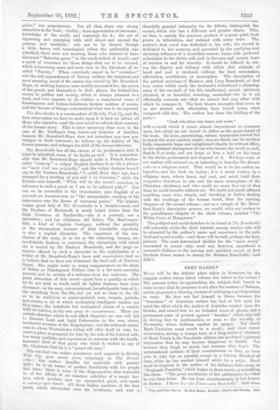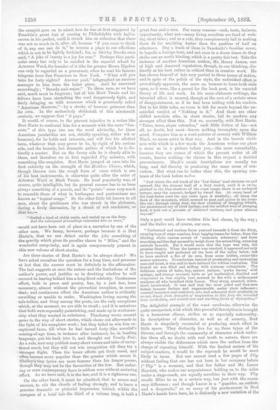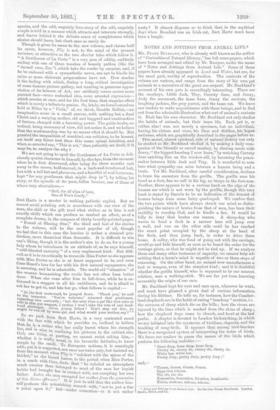BRET HARTE.*
WHIT will be the definite place taken in literature, by the- singular author whose latest volume lies before us for review ? The present writer, in approaching the subject, feels bound to state at once that he proposes to net after the manner of Balaam, and to propound a blessing, instead of indulging a predisposition to curse. He does not feel himself to blame because the. "funniness" of American writers has had at last upon his mind the effect which the justice of Aristides created upon the Greeks, and roused him to an irritated sense of gloom, and a permanent state of protest against " facetise," which may end in driving him to mathematics, or even to the worship of Humanity, where dullness reaches its apogee. Too much Mark-Twainism must result in a recoil ; and close recent observation, during a foreign tour, of a long series of students of Mark Twain in the Tauchnitz edition, has produced a general impression that he may become dangerous to health. Net because they laugh so much, but because they don't. The preternatural sadness of their countenances as they go from joke to joke has no parallel, except in a Christy Minstrel off duty, when he has washed himself white for a while. Much, must be forgiven to the author of the delicious little essay on. "Benjamin Franklin," which begins in these words, or something like them. "The great peculiarity of this philosopher is,—that he was born twins. He was born simultaneously in two houses in Boston. I know it ;—for I have seen them both." And when 4' Flip, and Other Stories. By Bret Hart% London : Matto and Windua. 1882. the essayist goes on to admit how he was at first staggered by Franklin's great feat of coming to Philadelphia with half-a- -crown in his pocket, until it struck him on reflection that there was not so much in it, after all, because "if you come to think of it, any one can do it," he secures a place in our affections which is not to be lightly forfeited; for, as Shirley Brooks once ,said, "A joke of beauty is a joy for ever." Perhaps that parti- cular essay has only to be excelled in the especial school by Artemus Ward, the founder of it (the far greater Hosea. Bigelow can only be regarded as a precursor), when he sent his famous telegram from San Francisco to New York. "What will you take for forty nights ? Answer paid," telegraphed an anxious manager to him from the latter place. And he answered accordingly ; "Brandy-and-water." To these men, as we have said, much must be forgiven ; but of late Mark Twain and his -fellows have been stretching the cord dangerously tight, and fairly deluging us with nonsense which is generically called " American Humour,"—by a stroke of humour grimmer than its own. In the melancholy shibboleth of this nineteenth ,century, we suppose that " it pays."
It would, of course, be the gravest injustice to a writer like Bret Harte to confound him for a moment with the mere " fun- nists " of this typo (we use the word advisedly, for these American jocularities are not, strictly speaking, either wit or humour), for he holds and interests, and will live his allotted term, whatever that may prove to be, by right of his serious side, and the homely, but dramatic pathos of which he is dis- tinctly a master. But on the funny side he is closely akin to them, and therefore we at first regarded Flip askance, with .something like suspicion. Bret Harte jumped at once into his first celebrity on the strength of the Heathen Glance, which, though thrown into the rough form of verse which is one .ef his best instruments, is otherwise quite after the order of Artemus Ward or Mark Twain. Its local popularity was, of course, quite intelligible, but its general success has to us been always something of a puzzle, and its "points" seem very much to resemble those of what in burlesques and pantomimes are known as "topical songs." So the other little bit known to all men, about the gentleman who was struck in the abdomen, .during a lively discussion, by a chunk of red sandstone, so that he,—.
" Smiled a kind of sickly smile, and curled up on the floor, And the subsequent proceedings interested him no more,"
-would not have been out of place in a narrative by one of the ether men. We fancy, however, perhaps because it is Bret Harte's, that we can detect under the joke something of the gravity which gives its peculiar charm to " Mliss," and the wonderful camp-baby, and is again conspicuously present in this new volume of short stories.
Are these stories of Bret Harte's to be always short? We have asked ourselves the question for a long time, and presume • at last that the answer must be definitely in the affirmative. The fact suggests at once the nature and the limitations of the author's power, and justifies us in doubting whether he will succeed in leaving behind him a long-lived celebrity. Continuous .effort, both in prose and poetry, has, by a just law, been necessary, almost without the proverbial exception, to secure that; and continuous effort the American author is evidently unwilling or unable to make. Washington Irving among the tale-tellers, and Gray among the poets, are the only exceptions which, at the moment, we are able to recall ; and it is notorious that both were especially painstaking, and made up in workman- ship what they wanted in substance. Thackeray wrote several -gems in the way of short stories, which shone out afterwards in the light of his completer work ; but they failed to win him ex- eeptional fame, till when he had turned forty (the novelist's coming-of-age time, in instance after instance), he, in boating language, put his back into it, and thought out Vanity Fair. As a rule, men may publish many short verses and tales of excep- tional merit, but they will not win recognition till they try a • stronger flight. Then the lesser efforts get their meed, and often become more popular than the greater which secure it. Shelley's tiny lyrics are more famous than his longer poems, though they may not be the favourites of the few. But endur- ing or even contemporary fame is seldom won without enduring effort. As we have said, it is the law, and it is a righteous one.
On the other hand, it must be admitted, that to secure real success, to stir the chords of feeling strongly. and to leave a genuine dramatic or pictorial impression behind, within the compass of a brief tale the third of a volume long, is both a
great feat and a rare. For many reasons—cash, taste, laziness, opportunity, what not—many living novelists are fond of writ- ing short tales ; and as a rule, they conspicuously fail in making them fit for anything bettor than the pastime of half an afternoon. Buy a leash of them in Tauclmitz's familiar cover, to beguile a foreign tour, and not once in a dozen times do they strike one as worth binding, which is a pretty fair test. Take the instance of another American author, Mr. Henry James, one of high and deserved reputatiou, though, to our thinking, dis- tinctly at his best rather in critical than in creative work. He has shown himself of late very partial to these torsos of fiction, and in spite of the polish of the style, the unfinished effect is provokingly apparent, the more so, because to leave both ends open, as it were, like a parcel for the book post, is his especial theory of life and work. In his more elaborate writings, the intended effect is secured, though at the cost of a certain sense of disappointment, as if he had, been trifling with his readers. But in his little tales, no room is left for much beyond the un- satisfied verdict of "Nothing in it." And there are other skilled novelists who, in short stories, fail to produce any stronger effect than this. Not so, assuredly, with Bret Harte. " Totus, teres, atque rotundus," each little fiction of his—not all, no doubt, but most—leaves nothing incomplete upon the mind. Compare him as a word-painter of scenery with William Black, no mean artist in that way. And in the laconic vivid- ness with which in a few words the American writer can place a scene as in a picture before you,—the more remarkably, because they are scenes of which the present writer at all events, knows nothing—he claims in this respect a decided pre-eminence. Black's scenic descriptions are usually too long, and fail thereby in producing the same sense of con- viction. But what can be better than this, the opening sen- tence of the book before us P-
" Just where the rod track of the Los Gatos' road streams on and upward, like the sinuous trail of a fiery rocket, until it is extin- guished in the blue shadows of the coast range, there is an embayed terrace, near the summit, hedged by dwarf firs. At every bend of the heat-laden road the eye rests upon it wistfully ; all along the flank of the mountain, which seemed to pant and quiver in the oven- like air ; through rising dust, the slow creaking of dragging wheels, the monotonous cry of tired springs, and the muffled beat of plunging hoof, it held out a promise of sheltered coolness, and green silences beyond."
Only a poet could have written this last clause, by the way ; and the italics are, of course, our own.
"Sunburned and anxious faces yearned towards it from the dizzy, swaying tops of stage-coaches, from lagging teams far below, from the blinding white canvas covers of mountain schooners,' and from scorching saddles that seemed to weigh down the scrambling, sweating animals beneath. But it would seem that the hope was vain, the promise illusive. When the terrace was reached, it appeared not only to have caught and gathered all the heat of the valley below, but to have evolved a fire of its own, from some hidden, crater-like source unknown. Nevertheless, instead of prostrating and enervating man and beast, it was said to have induced the wildest exaltation. The heated air was filled and stifling with resinous exhalations. The delirious spices of balm, bay, spruce, juniper, yerba buena,' wild syringe, and strange aromatic herbs as yet unclassified, distilled and evaporated in that mighty heat, seemed to fire with a midsummer madness all who breathed their fumes. They stung, smarted, stimu- lated, intoxicated. It was said that the most jaded and foot-sore horses became furious and ungovernable under their influence ; wearied teamsters and muleteers, who had exhausted their profanity in, ascent, drank fresh draughts of inspiration in this fiery air, extended their vocabulary, and created new and startling forms of objurgation."
The delightful example of the Traina neer:amigo, otherwise the quite unexpected, with which this powerful description is brought to a humorous climax, strikes us as especially noteworthy. In descriptions of character, as well as of scenery, Bret Harte is singularly successful at producing much effect in little space. They distinctly live for us, these types of the Sierras, and through the community of character which under- lies them all, no doubt with real truth to nature, there are always visible the differences which save the author from the charge of repeating himself. With the limited nature of his subject-matters, it would be the reproach he would be most likely to incur. But one cannot read a few pages of nip without feeling that one has not been in her company before (" Flip" is a woman), and that her father and Mr. Lance Harriett, who makes our acquaintance holding on to the axles under a stage-coach, are equally novelties in their way. Flip recalls Mliss to us in a certain way, but just with the neces- sary difference ; and though Lance is a "gambler, an outlaw, and a desperado," as so many of his predecessors in Bret Harte's hands have been, he is distinctly a new variation of the
species, and. the odd, ungainly love-story of the odd, ungainly couple is told in a manner which attracts and interests strongly, and leaves behind it the definite sense of completeness which stories should leave, but short ones so rarely do. Though it gives its name to the new volume, and claims half its space, however, Flip is not, to the mind of the present reviewer, BD attractive as the two shorter tales which follow it. "A Gentleman of La Porte" is a very gem of oddity, suddenly ending with one of those touches of homely pathos (like the "darned cuss, Jim ") ,which take the reader by surprise, and, if he be endowed with a sympathetic nerve, are apt to kindle his spine as more elaborate preparations have not. How similar is the feeling with which, during a long, critical investigation of some famous picture gallery, not wanting in generous appre- ciation of its labours of Art, one stiddenly comes across some painted face—some embodied idea, some arrested, expression— which creates at once, and for the first time, that singular effect which is surely a tribute to genius. So, lately, we found ourselves held at Milan by a "Pie*" of, we think, Gentile 33ellini,—an imaginative scene in a small canvas, with nothing but a dead Christ and a weeping mother, old and haggard and unattractive of feature, charged with a haunting power. The guide-books, we noticed, being summary of view, did not notice it, and we believe that the workmanship was by no moans what it should be. But granted the inequalitids of mankind, can criticism, to be honest, set itself any fairer test than this same spinal intuition, and when so arrested say, "This is art," then patiently set itself, if it may be, to analyse the why ?
We are not going to spoil the Gentleman of La Porte (a deli- ciously quaint character in himself, by-the.bye, from the moment when he is first discovered, after being for three months cast away in the snows, half-starved, in a bark-and-brushwood hut, but with a tall hat and gloves on, and a handful of real havannas, kept "for any gentleman that might drop in "), by telling his story, or the episode of its poor, fallen heroine, one of those of whose very aberrations,—
" Still, for all slips of hers, One of Eve's family,"
Bret Harte is a master in making pathetic capital. But we cannot avoid pointing out, in accordance with our view of the man, the skill or the gift (and what strikes us in him is not exactly skill) which can produce so marked an effect, as of a complete drama, in the compass of thirty broadly-printed pages. "Found at Blazing Star," the third and last of the stories in the volume, will be the most popular of all, though we feel that in this ease the heroine is rather a strained. pro- duction, more theatrical than dramatic. It is difficult to win one's liking, though it is the author's aim to do so, for a young lady whom he introduces in an attitude of, as he says himself, "cold-blooded curiosity" of a very unpleasant kind. But diffi- cult as it is to as critically to reconcile Miss Porter as she appears with Miss Porter as she is at heart supposed to be, and even Casa Beard's love for her with his first natural repugnance, she is amusing, and he is admirable. The world-old " situation " of the woman humanising the rustic has not often been better done. When she runs after him in full-dress, while he is en- throned in a waggon in all his untidiness, and he is afraid to ask her to get in, and lets her go, what follows is capital :—
At the first cross-road, he jumped down. Thank yell,' he said to the teamster. 'You're welcome,' returned that gentleman, lirie ding hitn curiously ; 'hat the next time a gal like that asks to , n this yer waggon, I reckon I won't take the vote of any dead- new passenger. Adios, young follow! Don't stay out late, ye might be run off by some gal, and what would your mother, say?' " So vve part from Bret Ha.rte, in a very contented mood with the fare with which he provides us, inclined to believe that he is a writer who has really learnt -where his strength lies, and is wise in confining his pictures to the cabinet size. Only one thing, at
Parting, we cannot resist asking him,— whether it is really
usual, in his favourite latitudes, to know People by the smell. To European notions, it is amazingly odd ; yet it is suggested, not once nor twice only, but insisted on,
from the moment when Flip is .c redolent with the spices of the thicket," as she kissed Lance, to the period when Miss Porter, in a coach with Cass, finds that "he exhaled an atmosphere ranch sweeter than belonged to most of the men her boyish habits had brought her in contact with, not excepting her own she even ealempt d father. Later,
e her mother from the possession of this divine effluence." It is just to add that the author him- self prefaces this astonishing remark with, "not to put a fine a point upon it;" but—under correction—is it not rather nasty ? It almost disposes 11% to think that, in the mythical days when Rosalind was an Irish rat, Bret Harte must have been a beagle.




































 Previous page
Previous page